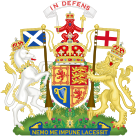Draft:International Criminal Court (Scotland) Act 2001
 | Review waiting, please be patient.
This may take 7 weeks or more, since drafts are reviewed in no specific order. There are 1,231 pending submissions waiting for review.
Where to get help
How to improve a draft
You can also browse Wikipedia:Featured articles and Wikipedia:Good articles to find examples of Wikipedia's best writing on topics similar to your proposed article. Improving your odds of a speedy review To improve your odds of a faster review, tag your draft with relevant WikiProject tags using the button below. This will let reviewers know a new draft has been submitted in their area of interest. For instance, if you wrote about a female astronomer, you would want to add the Biography, Astronomy, and Women scientists tags. Editor resources
Reviewer tools
|
| Act of the Scottish Parliament | |
 | |
| Long title | An Act of the Scottish Parliament to make provision for offences under the law of Scotland corresponding to offences within the jurisdiction of the International Criminal Court; to enable assistance to be provided to that court in relation to investigations and prosecutions; to make provision in relation to the enforcement of sentences and orders of that court; and for connected purposes. |
|---|---|
| Citation | 2001 asp 13 |
| Territorial extent | Scotland |
| Dates | |
| Royal assent | 24 September 2001 |
| Commencement | 17 December 2001 |
| Other legislation | |
| Repeals/revokes | Genocide Act 1969 |
| Relates to | International Criminal Court Act 2001 |
Status: Current legislation | |
| History of passage through Parliament | |
| Text of statute as originally enacted | |
| Text of the International Criminal Court (Scotland) Act 2001 as in force today (including any amendments) within the United Kingdom, from legislation.gov.uk. | |
The International Criminal Court (Scotland) Act 2001 (asp 13) is an act of the Scottish Parliament which incorporates into Scots law the Rome Statute of the International Criminal Court.
Background
[edit]Together with the International Criminal Court Act 2001, the Act allowed the UK to ratify the Rome Statute.[1]
The Scottish Parliament raised concerns over "political repercussions for Scotland" if universal jurisdiction in absentia were to be permitted.[2]
Provisions
[edit]The Act implements certain international crimes into domestic law.[3]
The Act excludes the crime of aggression.[4][5]
The Act makes forced pregnancy a specific crime.[6]
The Act allows for prosecution if the crimes were committed after 1 January 1991, even if they were committed outside the United Kingdom, as long as they were committed by UK nationals or by people subject to UK service jurisdiction.[7]
Further developments
[edit]The Act has been referred to in court cases, such as Office of the King's Prosecutor, Brussels (Respondents) v. Armas.[8]
In 2012, it was reported that Alex Salmond was facing pressure from SNP MSPs of the to amend the Act so that Tony Blair could be prosecuted under it.[5]
References
[edit]- ^ Arnell, Paul (2015-02-27). "Muddy Waters: Legislative Competence and the International Criminal Court in Scotland". Oxford University Commonwealth Law Journal. 2 (2): 281–290. doi:10.1080/14729342.2002.11421418. ISSN 1472-9342.
- ^ Wright, Lucy (2018-01-08). Universal Jurisdiction: The Need to Reverse the Retreat (PhD thesis). London School of Economics. Retrieved 2024-10-15.
- ^ Cryer, Robert; Mora, Paul David (2010-08-03). "I. The Coroners and Justice Act 2009 and International Criminal Law: Backing into the Future?". International and Comparative Law Quarterly. 59 (3): 803–813. doi:10.1017/S002058931000031X. ISSN 0020-5893.
- ^ "Letters: If we're going after war crimes, why should Blair get a free pass?". The Herald. Newsquest Media Group Ltd. 2022-03-05. Retrieved 2024-10-15.
- ^ a b "Scottish bid to charge Blair with war crimes". The Herald. Newsquest Media Group Ltd. 2012-09-08. Retrieved 2024-10-15.
- ^ Forced pregnancy: a commentary on the crime in international criminal law (PDF) (Report). Amnesty International. 2020.
- ^ Smith, Ben; Lang, Arabella (2013-02-21). "Recognising the killings of Iraqi Kurds as genocide" (PDF). UK Parliament. Retrieved 2024-10-15.
- ^ "Judgments - Office of the King's Prosecutor, Brussels (Respondents) v. Armas (Appellant) and others". UK Parliament. 2005-11-17. Retrieved 2024-10-15.
